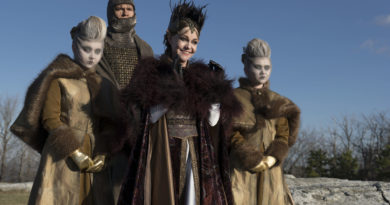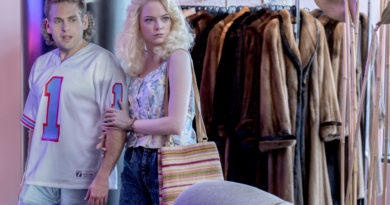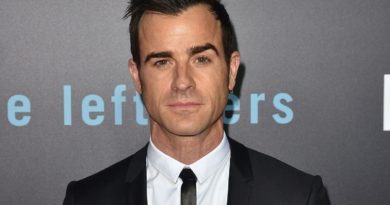Maniac Episode 10 Review: Option C
![]()
This Maniac review contains spoilers.
Maniac Episode 10
Maniac never truly took full thematic advantage of its three pills.
The mythological and emotional importance we place on numbers plays a big role in our stories. Three just happens to be one of the most mystical numbers of them all. One need only to look to the world’s most widely practiced religion for a prime example. The Holy Trinity is a paradoxical concept in which three disparate elements – the Father, the Son, and the Holy Spirit are all somehow one. Three equals not just one but THE one. It’s a divine mystery that adherents can spend their whole lives trying to understand.
For the non-religious among us, just turn to those other modern prophets, De La Soul, who understand that “Three is the Magic Number.” Why is three so important to us? I’m not sure. I’m not a mathematician or engineer so I can’t conclusively say it’s because our lizard brains understand that triangles are a powerful shape within nature and our creations. I just know as someone who participates in the human condition (sometimes kicking and screaming) that numbers can hold dramatic meaning and three, in particular, is powerful.
That’s why it’s so disappointing that Maniac never took full advantage of the A, the B, and the C pill. Perhaps some would disagree. Surely, Maniac, itself, would disagree. Maniac definitely depicts the realities of the A, B, and C pills throughout this season. The problem is that it never really does so in a structurally interesting way. We get to see Annie’s A experience but not Owen’s. Then we see two Annie and Owen B experiences followed by three our four total C experiences. Since these three trials all occur within an even-numbered 10 episodes and the B’s and C’s strongly resemble each other, it doesn’t feel like we’re experiencing a real A, B, and C. Without the brief sojourns into Dr. Mantleray and his mother’s Oedipal conflicts, we’re robbed of a clear a beginning, middle, and end.
That’s why it’s heartening that Maniac’s final episode is titled “Option C.” It’s even more heartening that the title has nothing to do with the drug trial. “Option C’s” approach to possibilities, human interactions, and structure present a compelling model for the rest of the series to have followed if it were given a do-over.
The trial is over and James is astonished to see that the subjects are still alive.
“You’re not dead?” Mantleray remarks, weeping.
“Are we supposed to be?” a red-faced Subject 5 responds.
The consequences for James and Azumi are swift. Poor James has clearly reached an emotional breakthrough with his mother but it is sadly one-sided. She rejects his offer for lunch and also requests to the NPB board that her son never be allowed to practice medicine again. The board obliges.
In the end, all James and Azumi have are a bonsai tree, a souped-up Chevrolet, and each other. The level of James and Azumi weirdness again doesn’t fully work. I’m not sure we needed a reminder that James is obsessed with Atlantis and I know we didn’t need to see whatever the hell that kiss is. But James and Azumi finally accepting that they need each other operates as a solid preview of what’s to come.
Despite what James says, there’s no real way of knowing whether the pill therapy was a success. Sure, all the subjects got pretty far in. They also just happened to have to deal with a murderous supercomputer so who’s to say! It’s clear, however, that both Owen and Annie are changed individuals.
Annie immediately returns home to tell her father everything she’s been meaning to say.
“I need to tell you that it’s not OK for me,” she says to the A-Void machine in the backyard. “Yes, you married a woman who was sick and she couldn’t handle having a family and she left us. Then your daughter died and it was the wrong one. It’s OK that you had to go in there but I don’t accept it anymore. I need you out here with me, dad.”
It’s a hell of a speech only slightly undercut by the fact that her father is actually in the kitchen. Annie and her father, played wonderfully by Hank Azaria, have an effective, cathartic heart to heart over some coffee.
This is where the real “pattern” of Maniac begins to reveal itself. It’s not the number three we should have been concerned with this whole time. It’s two. All it takes it two people making a connection to improve wellness. That’s a fact that Maniac will further hammer home with its favorite lost soul, Owen.
Following the trial, Owen isn’t changed in temperament or affect. He still speaks so quietly that I wish my laptop had a higher volume setting. This version of Owen is braver, more assured though.
It’s foolish and heartbreaking when Owen tells Annie “I just wanted to let you know. I’m not gonna follow you around. I’m not gonna make this more than it was.” They made a real connection here. It’s OK to want to be friends. This is also, perversely, a sign of growth for Owen. Sure, it’s an overcorrection and goes against the fundamental lesson of the trial – that we all need help – but better safe than sorry, I suppose.
Owen is also able to come clean at his brother’s trial and tell the whole world definitively that his brother. Naturally, the Milgrims send Owen to a mental health facility for his troubles.
While there, however, Owen does seem to be getting some decent care. After telling the story of the NPB trial to a therapist, she has one question for him.
“I still don’t understand why you never tried to talk to Annie again,” she asks.
For starters, that’s kind of a fucked up question for a therapist to ask. “I know you have schizophrenia and apparently sent Anthrax through the mail, Mr. Milgrim, but what about your little experimental drug trial girlfriend?”
It’s a weak lob from the show that nonetheless sets up something important. Owen only sees two options for his time with Annie. Option A – she wasn’t real. Option B – she was real and yet he imagined the connection they had. Of the two options, Owen hopes for Option A.
It goes unspoken by anyone on the show (save for the episode’s title) but there is an Option C. What if not only was Annie real – but the connection they felt real too? Maniac squandered its opportunity to create meaning in Pills A, B, and C. Here at the end, however, it’s deftly pulling off something lovely with a trinity of different kind.
Pill C is nonsense. Option C though…that’s everything. Option C is what we all want. In terms of happiness it may be the only thing that matters. Option C is other people. Some French man thinks that hell is other people. Maniac gently points out that they’re the exact opposite.
Annie discovers where Owen is being held and runs off to rescue him.
Owen isn’t as happy to see her as one would expect.
“It’s just easier if you’re not real,” he tells her.
“I am real. You know me. You’re braver than this,” she says.
And Owen is braver than this. It’s still unclear if Owen actually has schizophrenia or not and I, uh…I’d like for the show to address that. The ending the show chooses is cathartic enough anyway. Annie smuggles Owen out and they take off to the freedom of Salt Lake City with their new dog, Harpo in tow.
It’s certainly a powerful image and concept to go out on. Pill A, B, and C and Options A, B, and C ended up being less important that simply two people. The mystery of Maniac’s paradoxical trinity equation works out to two, not one.
These last two episodes of Maniac are befitting a show with lofty ambitions. The route it took to get here was not. Option C and Pill C were a good look on Maniac. It was the A and B that it struggled with.
Alec Bojalad is TV Editor at Den of Geek. Read more of his stuff here. Follow him at his creatively-named Twitter handle @alecbojalad


